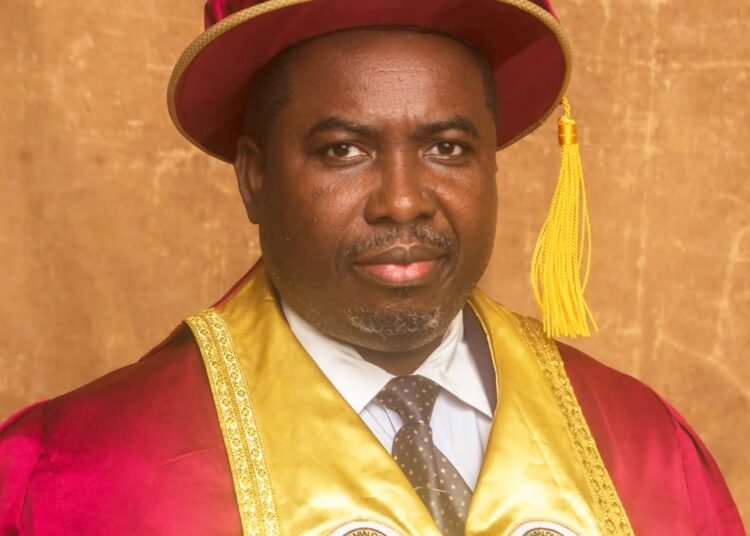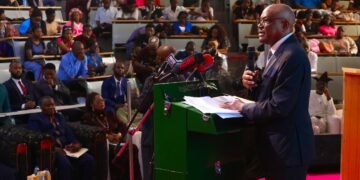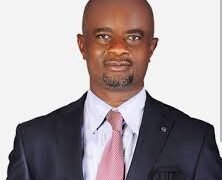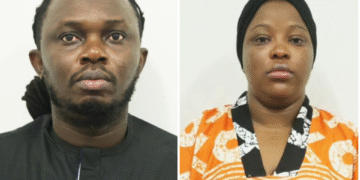On Thursday last week, the Senate screened and confirmed President Bola Ahmed Tinubu’s nominee for the position of the National Chairman of the Independent National Electoral Commission (INEC), Professor Joash Ojo Amupitan. The Law professor was drilled for more than two hours and asked cogent questions related to the assignment at hand. Though most of those questions should have been directed at Amupitan’s predecessor in office, Professor Mahmood Yakubu, the Law professor, showed himself at his diplomatic best, while at the same time showcasing his knowledge about the nation’s electoral process.
Amupitan was asked about the key challenges in the electoral process, especially the role of BVAS and IReV, as well as the complexities of election logistics. He minced no words, stating that only credible elections would promote public confidence in the nation’s democracy. He also touched on the possibility of deploying drones to handle election logistics so as to ensure that no voter is left behind during the polls.
“If elections are credible, it becomes easy to regain the confidence of the people,” Amupitan said. It was as if he was directly responding to the challenge of election apathy among Nigerians, which has seen voter turnout drop by as much as 26 per cent since 1999.
He addressed the questions of the Bimodal Voter Accreditation System (BIVAS) and the INEC Result Viewing Portal (IRev), as well as the failure of these two innovations to deliver electoral security in the 2023 elections. The new INEC Chairman was right to say that he would audit the situation, to be able to tell the capacity of the nation’s infrastructure and the electoral commission to deliver on the innovations.
Hear him: “A lot of people did not know until the Supreme Court came out to say that BVAS wasn’t a mandatory collation system. It was supposed to guarantee some checks and balances. The glitches during the presidential election eroded the credibility. I will need to get there and audit the system to know whether we have the capacity. I must also consult with other stakeholders like the Nigerian Communications Commission.”
He also deployed his knowledge of the governmental system when he told Senator Abdul Ningi, who raised questions on technological inputs in the electoral process, by saying: “On the issue of court decisions and technological systems, there has been confusion over certain innovations introduced by INEC, such as the electronic collation system. The Supreme Court has clarified some of these matters. When we assume office, we will assess the infrastructure on the ground, review the technology, and adopt the best approach that enhances transparency and credibility in elections.”
The new INEC helmsman also left us with some soundbites that we can challenge him with in the months ahead, when he said his watchword would be to ensure no voter is left behind. “On the issue of security and logistics, I recognize that these are major challenges due to the size and diversity of our country. We will work closely with the Joint Committee on Election Security to enhance protection of materials, personnel, and voters — especially in high-risk areas.
“We will also invest more in logistics and technology to ensure that every part of Nigeria is adequately reached. If necessary, we can deploy innovations — such as drones and other secure means — to guarantee that election materials reach their destinations. No voter will be left behind. That will be our guiding principle,” he said.
The professor also mentioned the need to set up an electoral offences commission as one of the key issues on his agenda. But he touched on a critical point when he said that he would review the infrastructure on the ground when he assumes office. And that is why I believed that some of the questions put to Amupitan should have been asked Yakubu, who ran INEC for ten years before proceeding on terminal leave. Those questions should have formed part of NASS’s oversight on INEC before Yakubu’s departure.
I say this because the time Amupitan needs to review and audit the system is not there at all. This is October 2025. If we go by the dictates of the Electoral Act 2022, the process for the emergence of candidates for the 2027 elections should start early in the new year. And if the National Assembly members can pull through their new plan to hold presidential and gubernatorial elections more than 180 days before the next swearing-in, thus making November 2026 the most feasible date, preparations are already getting late for INEC. Remember that the candidates for presidential elections of 2023 election emerged between late May and early June 2022. That is almost a clear year ahead of the elections. What all these indicate is that the luxury of time is not there at all.
Now, we should be asking ourselves why the National Assembly always waits until the last minute before electoral act amendments are passed. The lawmakers kept everyone guessing ahead of the 2023 elections, and you could see a party like the Peoples Democratic Party (PDP) going to the May 2022 convention with a hurriedly interpreted version of the Electoral Act. The All Progressives Congress (APC), which delayed a bit, was able to expand its delegate system. It has always been the case that the Senate and the House of Representatives want to wait until the last minute before amendments to the electoral act are passed. That is somewhat absurd. An Electoral Act that would usher in a major election should have been test-run with mid-session elections or byelections to enable us to isolate the challenges that might emanate. The lawmakers perhaps failed to acknowledge that the bulk of the ball is in their court when they fired some questions at Amupitan. These are people who have participated in elections at different levels, asking a university don what he would do to better the nation’s electoral system. They forgot that he is a man who has not operated any electoral act before and is more or less a greenhorn on the job.
Rather than toss the ball to Amupitan’s court, I think the lawmakers must admit that they have wasted too much time delaying the 2025 Electoral Act Amendment bill. You even wonder why the NASS Committees on Electoral Matters were doing immediately after the ruling of the Supreme Court on the 2023 presidential election, which defined the roles of BVAS and IReV among the technological innovations INEC brought into the electoral process in 2023. I cannot account for the long silence from the NASS committees all through 2024 and for most of 2025. And so, we have to wait until the last quarter of the year before we start struggling to pass the Electoral Act Amendment Bill.
Instead of beating about the bush on this matter, let us tell the NASS members that the most important amendment in the Electoral Act should be the inclusion of BVAS and IReV as electoral legal tenders. The should be mandatory election collation tools. The National Assembly must make it mandatory for records on BVAS to count while a candidate is challenging the election data. If there is no correlation between accredited voters and total votes cast, then it should be known that such an election is null and void. The same should go for IRev. Any election result that cannot be uploaded to the portal should not count. Every electoral officer must be compelled to stay on the network for as long as possible until the election results are uploaded. There should be no crime in combining the manual and electronic systems effectively. I know several lawmakers at the state and national level who won elections in the 2023 process because the results from polling stations in their constituencies were uploaded on IReV. It means that only those who don’t have the backing of their constituencies would be afraid of BVAS and IReV.
Besides, there is also the need to take away the power to declare winners of an election from the courts. Winners should only emerge through the votes of the people. A situation where the courts are allowed to determine the winners of an election because of alleged irregularities or violence shouldn’t hold anymore. If there is reported violence in an area, the results should be put on hold until a makeup election is held to afford the people of the area the opportunity to cast their ballots for the preferred candidate.
Democracy is supposed to be a government of the people. By all intents and purposes, it should emphasise the rule of the majority of the people, not some judges of the election tribunal, the Court of Appeal, or the Supreme Court. No matter the level of irregularities, elections should be repeated until sanity prevails at the polls. I agree with Amupitan when he said that only credible polls can restore confidence in the democratic process. If you are close to the grassroots, you will already know the extent of the loss of confidence in the democratic process by the man on the street. You’ve definitely heard of the dibo ko se obe (vote and cook a pot of soup) saga, which has now engulfed most states of the South. In the North, the issue was about underage voters; now we’ve added the merchandising of Permanent Voters’ Cards (PVCs) to the ugly trend. If a leader emerges from a discredited election, his loyalty would never be to the people, who are the custodians of power. He would trust in those who manipulated the process to pave the way for him or her. With that, our democracy suffers, development is arrested, and we keep counting years of underdevelopment. Every independence anniversary is devoted to lamentations of missed opportunities and unreached potential. Nigeria is a crawling giant at 65. May we not have it remain a toddler at 100.
(Published in the Sunday Tribune, October 19, 2025)













